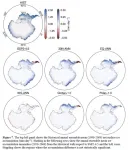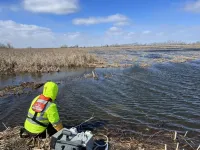(Press-News.org) University of Virginia School of Medicine public health researchers, together with colleagues at the University of South Carolina, have received a $3.37 million grant from the National Institutes of Health to determine if online behavioral weight-management programs for rural residents can be improved by adding a human touch.
Online obesity programs have typically failed to yield the same benefits as in-person programs, the researchers note, so they will test three approaches to add human involvement. More than 600 volunteer participants will be enrolled in a core online 24-week weight-loss program and randomly assigned to receive one of two forms of feedback on their self-monitoring efforts, as well as potentially receiving additional components including weekly group video sessions and individual coaching calls.
The goal is to help residents of rural areas, where in-person weight-loss programs can be scarce, manage their weight and fight the obesity epidemic that has swept America.
“Weight loss of as little as 5% to 7% can reduce obesity-associated co-morbidities,” said UVA public health researcher Becca Krukowski, PhD, one of the principal investigators. “Although lifestyle interventions successfully produce weight losses of this magnitude, access to weight management programs is limited in rural areas. This study will examine how digital interventions can be optimized for delivering weight loss programs to rural populations.”
The Obesity Epidemic
More than 130 million Americans are overweight or obese, and people living in rural areas experience significantly higher rates of both obesity and chronic illnesses associated with obesity. Many rural areas are also beset by an increasing lack of access to healthcare resources. So finding better ways to help rural residents manage their weight could have big benefits for both individuals and society. That type of ambitious goal to improve the health of people across Virginia and beyond aligns closely with UVA Health’s first-ever 10-year strategic plan, which aims to transform healthcare by finding innovative ways to help people live longer, healthier lives.
Krukowski, of UVA’s Department of Public Health Sciences, notes that there is already some evidence that adding a human component to digital obesity-treatment programs can improve their effectiveness. She hopes her new trial will offer answers on the best “package” of treatment components.
Over the next three years, she and her collaborators will enroll and provide the iREACH program for a total of 616 men and women, with the goal of determining which approach, or which combination of approaches, is most effective at promoting weight loss and subsequent weight maintenance. They will look at factors that contribute to weight loss success, such as social support, accountability and problem solving. They will also consider elements such as sex, race/ethnicity and age, as well as the costs of the intervention components.
The iREACH program has just started recruiting for the first wave, which will start right after the new year – perfect timing for New Year’s resolutions related to improving health.
Improving America's Health
Ultimately, Krukowski and her team hope their research will lead to optimized online weight-loss programs that will be more accessible to rural residents than in-person programs. That would increase the public-health benefits of the programs and will inform public health policy decisions such as whether the programs should be covered by Medicare, Medicaid and other health insurance companies.
“The iREACH study is an exciting opportunity for rural residents to have access to a cutting-edge behavioral weight loss program and also contribute to science,” Krukowski said.
The trial is IRB No. HSR220408. For more information, visit https://www.ireachstudy.org/ or call 1-866-271-7217.
The five-year NIH grant, from the National Institute of Diabetes and Digestive and Kidney Diseases, is No. R01DK135227.
To keep up with the latest medical research news from UVA, subscribe to the Making of Medicine blog.
END
$3.37 million NIH grant backs effort to optimize online obesity programs for rural residents
2023-11-15
ELSE PRESS RELEASES FROM THIS DATE:
The American Pediatric Society names Dr. Rachel Katzenellenbogen as the recipient of the 2024 Norman J. Siegel New Member Outstanding Science Award
2023-11-15
The American Pediatric Society (APS) is pleased to announce Rachel Katzenellenbogen, MD, as the 2024 Norman J. Siegel New Member Outstanding Science Award recipient for her considerable contributions to pediatric science. The award will be presented to Dr. Katzenellenbogen during the APS Presidential Plenary at the Pediatric Academic Societies 2024 Meeting.
The award was created in honor of one of the world’s leading nephrologists, Norman J. Siegel, MD, FASN. Dr. Siegel was an outstanding teacher and mentor, nurturing the early careers of numerous fellows and residents. He was a leader within the medical community and educated the ...
Climate engineering could slow Antarctic ice loss, study shows
2023-11-15
Scattering sunlight-reflecting particles in the atmosphere could slow rapid melting in West Antarctica and reduce the risk of catastrophic sea-level rise, according to a study led by Indiana University researchers.
The study, one of the first to look at how climate engineering might impact Antarctica, comes as scientists sound the alarm over the increasing likelihood of accelerated ice loss in West Antarctica this century. The work appears in the Journal of Geophysical Research: Atmospheres.
“Even if the world meets the ambitious target of limiting global warming to 1.5 degrees Celsius above pre-industrial levels — which we are not on track ...
New report outlines microbial solutions to mediate methane emissions
2023-11-15
Washington, D.C.—The American Academy of Microbiology, the scientific think tank and honorific leadership group at the American Society for Microbiology (ASM), has released a new report, The Role of Microbes in Mediating Methane Emissions. The report highlights recommendations to further the scientific community’s understanding of microbial processes of methane production and consumption to mitigate methane emissions and address climate change.
Microbes can influence climate change through biogeochemical cycles that ...
NYU Tandon takes a quantum leap with new minor
2023-11-15
NYU Tandon School of Engineering is poised to become one of an extremely select group of American universities offering an undergraduate program in quantum technology, situating it at the forefront of a fast-growing field in which high employer demand significantly outpaces available talent.
Beginning in the spring 2024 semester, NYU Tandon students can start earning credits towards the new quantum tech minor, offered through the Department of Applied Physics.
In the past decade, quantum technology – the use of ...
Stand Up To Cancer announces three teams focused on gastroesophageal cancer
2023-11-15
LOS ANGELES – Nov. 15, 2023 – Stand Up To Cancer® (SU2C) today announced three Research Teams focused on bringing new therapies to clinical trials for the treatment of gastroesophageal cancer (GEC). The Research Teams, a part of a Dream Team Collective supported by the Torrey Coast Foundation, will unite top researchers from 11 institutions to address critical problems in GEC prevention, diagnosis and treatment. The Dream Team Collective aims to foster new and inclusive cancer research on the causes and treatments of GEC, mentor a new generation of scientists focused on GEC, bring ...
Should a hospital invest toward specializing in an area? Or diversify? The impact of a hospital’s portfolio strategy on patient demand
2023-11-15
Researchers from Indiana University and Texas Christian University published a new Journal of Marketing study that examines the impact of a hospital’s portfolio strategy on patient demand.
The study, forthcoming in the Journal of Marketing, is titled “Hospital Portfolio Strategy and Patient Choice” and is authored by Sarang Sunder and Sriram Thirumalai.
Structural changes in the healthcare industry (e.g., the institution of the Affordable ...
Surveilling wetlands for infectious bird flu — and finding it
2023-11-15
Recently, morning omelets and holiday dinners have gotten more expensive. One likely cause is bird flu, outbreaks of which led to the deaths of millions of chickens and turkeys from infection or culling in 2022, according to the U.S. Department of Agriculture, and which still demands rigorous monitoring of wild populations. Now, reporting in Environmental Science & Technology Letters, researchers have developed a method that detected infectious bird flu virus in wetlands frequented by waterfowl.
Wild birds represent a significant reservoir of avian influenza ...
Not so silver lining: Microplastics found in clouds could affect the weather
2023-11-15
From the depths of the seas to snow on mountains and even the air above cities, microplastics are turning up increasingly often. Now, in ACS’ Environmental Science & Technology Letters, researchers have analyzed microplastics in clouds above mountains. They suggest that these tiny particles could play a role in cloud formation and, in turn, affect weather.
Microplastics — plastic fragments smaller than five millimeters — originate from a myriad of items used daily, such as clothing, packaging and car tires. As research in the field evolves, scientists are not only detecting microplastics in the atmosphere but also investigating how they may play a role in cloud formation. ...
Association of molecular subtypes in bladder cancer with response to neoadjuvant chemotherapy, progression, and survival
2023-11-15
Considering the molecular subtype of muscle-invasive bladder cancer (MIBC) based on differences in tumor RNA expression can improve the ability of an existing tumor biomarker such as the COXEN score to predict which patients’ tumors are likely to respond to chemotherapy given before surgery. Individual molecular subtypes, however, were not associated with significant differences in patients’ overall survival (OS) or progression-free survival (PFS) times.
Those are the conclusions from a secondary analysis of data from the S1314 clinical trial, a large study in patients with MIBC that was conducted by the SWOG Cancer Research Network, a clinical trials group funded by ...
Colliding ribosomes activate RNA repair
2023-11-15
Aldehydes are toxic compounds that are produced in the body by metabolic processes, especially upon alcohol consumption. They are dangerous because they bind to cellular macromolecules such as DNA, RNA, and proteins, and crosslink them.
Crosslinking damage to DNA must be repaired by the cell to prevent premature aging and cancer. However, it was previously unknown whether and how cells sense and resolve crosslinking damage to single-stranded RNA. A team led by Professor Julian Stingele from ...




